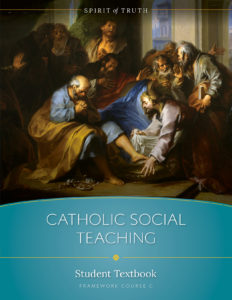
Overview
Students will learn of the body of doctrine collectively known as Catholic Social Teaching, which proposes principles for integrating the truth of the Catholic Faith into society in pursuit of justice, peace, and the common good.
- Spirit of Truth, High School Course C Teacher’s Guide
- Spirit of Truth, High School Course C Student Textbook
- Spirit of Truth, High School Course C Student Workbook
- Glossary
- Topical Index
- Index of Citations
- Final Exam
- Final Exam Answer Key
- Final Exam Study Guide
- Final Exam Essay Questions Form A
- Final Exam Essay Questions Form B
- Final Exam Essay Questions Form C
Units
When Jesus ascended into Heaven, He gave His disciples the mission of evangelization—the mission of building up the Kingdom of God among all the peoples of the world. This Kingdom, however, would not be like the other kingdoms of the world—which seek power and dominance—but would be a Kingdom of God’s mercy and salvation for the entire human family who toils under the burden of sin. The Church fulfills this mission by spreading the Gospel message and teaching the Christian way of life. Catholic Social Teaching plays an essential role in this work of evangelization, which is accomplished not through power and politics but through humble service to our fellow man. Throughout Scripture, God makes it clear that society must operate in both justice and charity. Justice is the moral virtue that disposes us to give what is due to God and our neighbor. Social justice pertains to the responsibility of society and its members to respect human dignity. It requires all levels of society to work together to ensure the temporal well-being of all. We must remember that charity and justice go hand in hand; a society without love can never be just. Through His birth and His ministry, Jesus identified Himself with the poor, the lowly, and the marginalized, showing us that in order to truly safeguard human dignity, we must honor that dignity in the weakest and most vulnerable members of society. Society must safeguard the rights of its every member and protect the nuclear family. The family is our first community, the first authority to which we are subject, and the first witness to our dignity as children of God. To safeguard the common good and protect the persons within society, the State also has the obligation to protect our natural human rights. The Catholic understanding of rights is rooted in the natural law and is associated with our social responsibilities. Our rights ultimately have their origin in God, and so it is the government’s job to protect rights, not grant them. Sin has widespread social consequences for the human family. No sin is ever really private, even if it is done in secret. Because we are social beings by nature, our sins affect our social relationships and in time create patterns in our society that are structures of sin that harm the human family. To counteract these structures of sin requires conversion of heart and participation in the moral life. God gave us signposts on how to live the moral life in the Ten Commandments and the Beatitudes, both of which possess personal as well as social dimensions.

